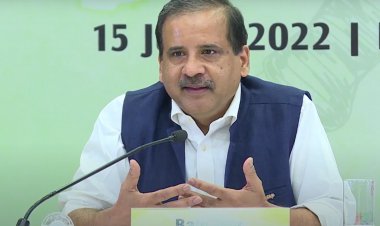Cooperative Education Fund must remain with NCUI: Sanghani
Reacting to the proposed clause in the draft amendments to the Multi-State Cooperative Societies Act, 2002, that the Cooperative Education Fund has to be maintained by the Central Government, NCUI President Dileep Sanghani has said that the existing provision in the Multi-State Cooperative Societies Act, 2002, through which NCUI has the authority to collect and manage the Cooperative Education Fund, must remain unchanged.

Reacting to the proposed clause in the draft amendments to the Multi-State Cooperative Societies Act, 2002, that the Cooperative Education Fund has to be maintained by the Central Government and proceeds may be used for cooperative education and training through the National Cooperative Union of India (NCUI) or any other agency as decided by the Central Government, NCUI President Dileep Sanghani has said that the existing provision in the Multi-State Cooperative Societies Act, 2002, through which NCUI has the authority to collect and manage the Cooperative Education Fund must remain unchanged.
According to a press release issued by NCUI, Sanghani further said that the maintenance of the Cooperative Education Fund by the Government would give a signal that the government wanted to control the fund, in which it had no contribution. This is against the autonomous principles of cooperatives, he said. He said this would be against the International Cooperative Alliance’s (ICA’s) 4th Principle of Cooperatives, which is “Autonomy and Independence”.
The NCUI press release says that NCUI is an apex body of the cooperative movement in the country. Education and training is one of its prime objectives well recognized by the Government of India and cooperatives. As per section 63(1)(b) of the Multi-State Cooperative Societies Act, 2002, “a multi-state cooperatives society shall out of its net profits in any year credit one per cent to cooperative education fund maintained by the National Cooperative Union of India.” The fund amount is 25 crores annually. The Cooperative Education Fund was created under the Multi-State Cooperative Societies Act, 1984, and is maintained by NCUI since inception as per guidelines of the government. The Education Fund committee, in which NCUI President is the Chairman, also comprises senior officials of the Ministry whose approval is taken before sanctioning funds for various education and training programmes.
Over the years, says the NCUI press release, as an implementing agency of education and training programmes of the government, NCUI has trained a large number of offices/non-officials from primary to the national level in the various sectoral areas of cooperatives, which has been widely appreciated. The application of fund for education and training programmes, decided by the Committee, is reflected in the Annual Account and Annual Report of NCUI placed before the Parliament. Through the recent proposal, the government wants to act as the custodian of the fund so that probably there may be better monitoring and administration of the fund.
NCUI says that based on the views of the representatives of member institutions, it has voiced its concerns over the various issues pertaining to the draft amendments of the Multi-State Cooperative Societies Act, 2002, including the issue of the Education Fund, to the Ministry, which recently has sought comments from the various national federations on the draft amendments. The members have felt that the management of the Education Fund by the Central Government will marginalize the importance of NCUI which is an umbrella organization of the cooperative movement.
Besides, it is apprehended that if the Central Government takes control of this fund, then at the state level also the respective state government may take control of such funds in its fold, which may affect activities of education and training at the state level. The members felt that in accordance with cooperative principles, the government should decentralize the rights of cooperatives instead of controlling them.







































